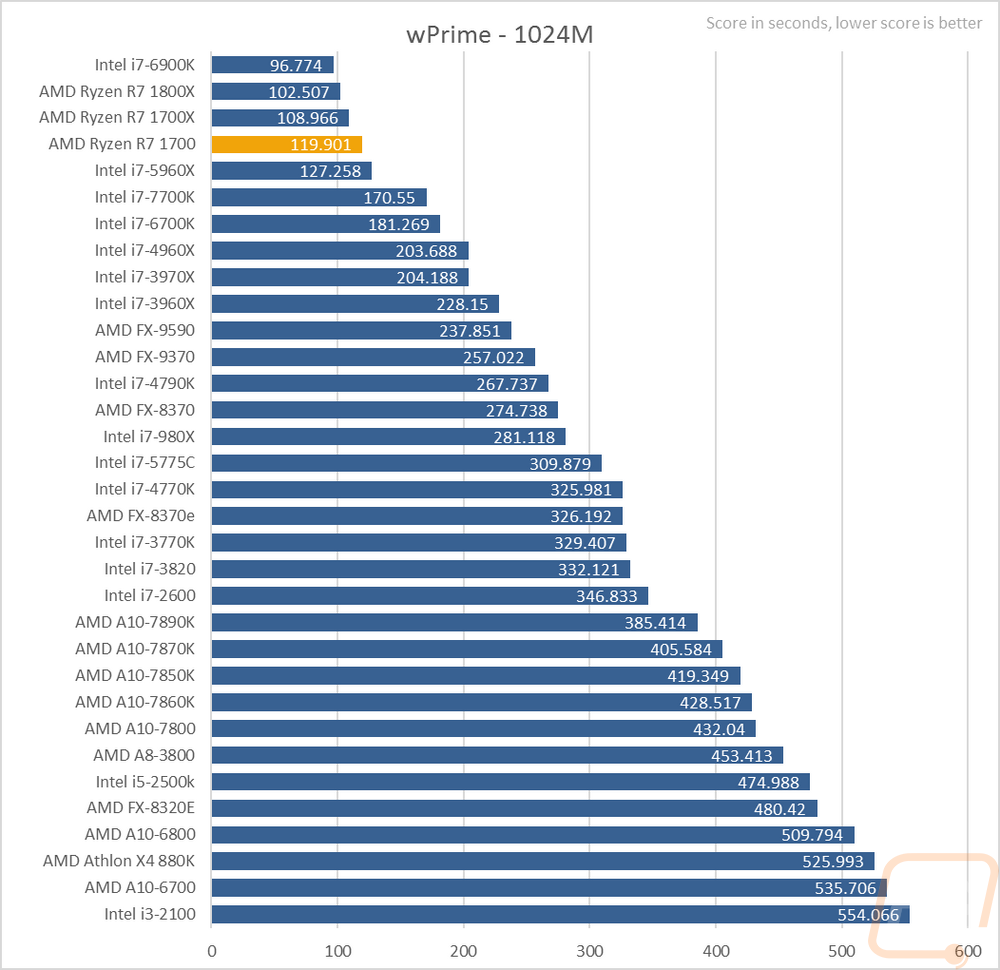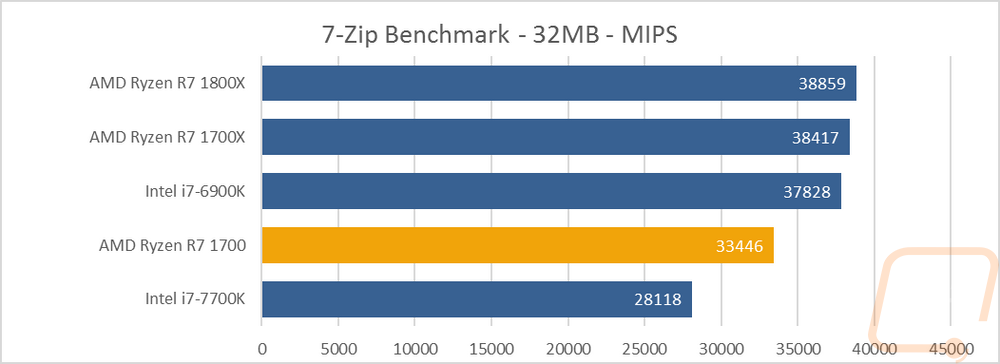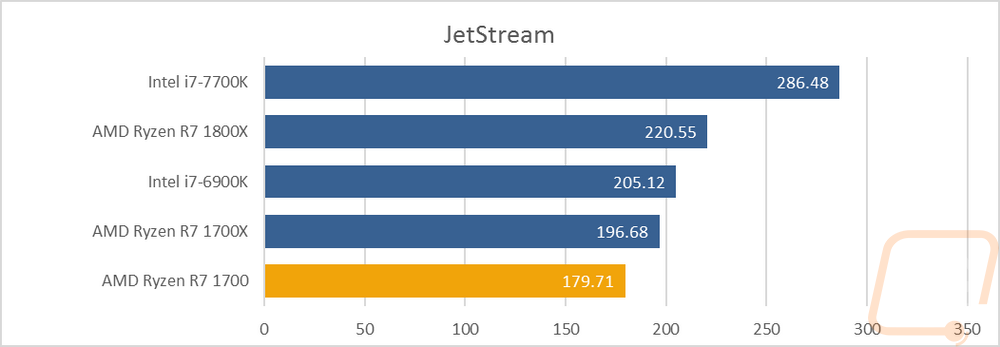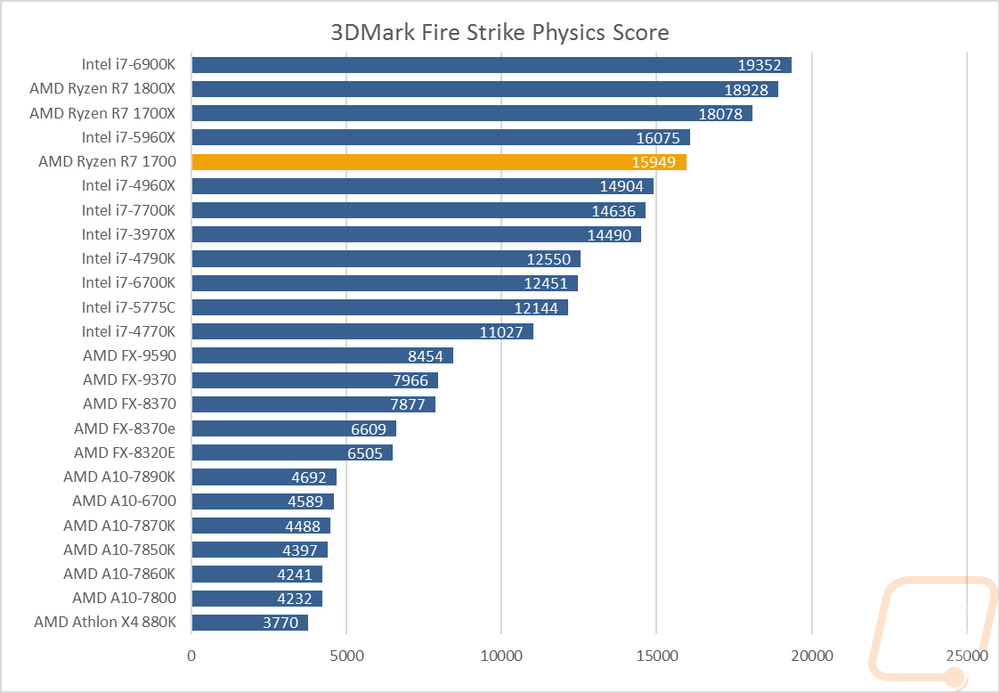CPU Performance
It feels a little weird just jumping right into the performance, but like I said I did already cover the R7 1700 in the previous article. So I started off my testing using X264 HD Benchmark 4.0 where we can get a look at the overall video processing power of the CPU. In this and all of my testing, I was really focusing on how the 1700 compared to the two other Ryzen CPUs as well as the i7-7700K that is priced in the same range. In this test, the 1700 did well, but the 7700K outperformed by a big margin. This wasn’t a huge surprise though given the 7700K did outperform the two other Ryzen CPUs as well. The gap between the 1700 and the 1700X wasn’t that big though.

For my next set of tests, I used one of my favorite benchmarks, Cinebench R15. I don’t like this one because of the content really, it is focused on rendering a photo, I like it because it is one of the only tests that tests with all of the cores and then again with a single core. This is a great way to check out overall processing power then get a better look at the overall efficiency of the CPU when the number of cores are out the window. This helps us get an early look at the performance of software without good multi-core performance. So in the single core benchmark, the 1700 came in just below the 1700X due to its lower clock speed but was well below the high clock speed and high single core performance of the 7700K. The multi-core test though was a completely different story. Like the previous Ryzen CPUs, the 1700 jumped WAY ahead because of its 8 core 167 thread design where the 7700K with its 4 core 8 thread design is fast but not as multi-threaded.


Next, I took a look at wPrime, an older prime number calculation benchmark and the also old but still relevant 7-zip benchmark that checks out encoding and decoding speed. In both the extra cores really help but I was most impressed that the 1700 was able to even best the i7-5960X in wPrime. The 7700K wasn’t even in the same class in these benchmarks.


Next, I started to look at a little more everyday performance with two browser based benchmarks that focus mostly on Java and HTML5 performance. In both the 1700 did fall behind with the 7700K outperforming by a lot in JetStream and both Intel CPUs being ahead in Google Octane. The gap between the 1800X and 1700X wasn’t big but the gap between the 1700X and the 1700 was larger due to the lower XFR clocks.


We then have Passmark where I run the entire CPU benchmark suite to get an all around CPU benchmark. I tested using the older Passmark Performance Test 8 and the newer Performance Test 9 so I could include some of the older PT8 results for comparison. Here the R7 1700 still stays up in the top of the charts ahead of the 7700K due to the higher core counts. Most of Intel’s older 6 and 8 core CPUs are still far ahead though partially due to the higher memory bandwidth of the quad channel memory on them.


For an all around and mostly real world look I like PCMark 8 Home benchmark to test loading of everyday applications. Here the 1700 did come in at the bottom of the charts with the other two Ryzen processors just above it. The 6900K did well but the high clock speeds and good single core performance of the 7700K really helped here.

To start getting a look at potential gaming performance I start with 3DMark using the Fire Strike benchmark but I focus on the physics score that is CPU focused and takes the GPU out of the equation. I also test using the Dolphin emulator to get a look at a CPU focused emulators performance. In 3DMark the R7 1700 did extremely well, outperforming the 7700K and coming in nearly dead even with the 5960X. The story wasn’t the same though in Dolphin 5.0 where a higher score is worse. The 7700K made it through the same benchmark in half the time.


For gaming testing, as its only a portion of our overall test suite I do only test with three games. Given the Ryzen performance numbers in gaming, I may have to revisit game testing with a wider range, but I tested using three modern games with benchmarks. The RX480 paired with the CPU is in line with what someone buying a 1700 might be looking at as well. Anyhow the results were interesting, to say the least. The HITMAN results especially where the R7 1700 actually outperformed the other two Ryzen CPUs even after retesting all three again multiple times. In Hitman there was a two FPS gap between the 1700 and the 7700K, still more than I would like to see for similarly priced products but better than before. At best though those odd results mean a flaw in the Hitman benchmark or an issue in our testing (even after the multiple retests) so I would still take them with a grain of salt.

As for the other two games tested. I tested in Ashes of the Singularity, a notoriously demanding game set to a CPU focused benchmark. The 1700 was close to the other Ryzen CPUs but this game had the biggest gap in FPS. It is of course designed to show the biggest gap as well being so CPU focused. Then in Deus Ex: Mankind Divided the results again had the 7700K and even the 6900K ahead but only by a little less than one FPS this time around. In the end, the results tell us what I saw previously that the higher clock speed and overall single core performance of the 7700K show the most during game testing.




